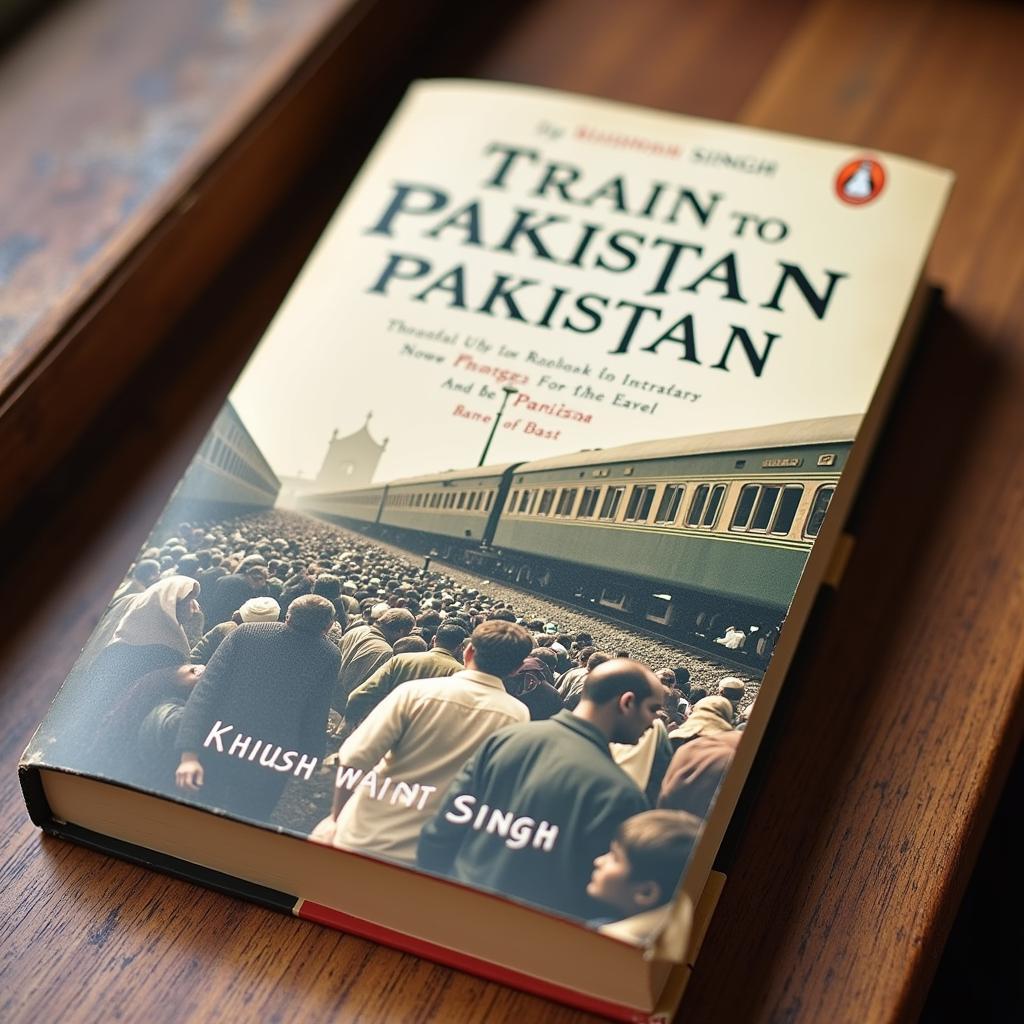Khushwant Singh’s Train to Pakistan is a harrowing portrayal of the 1947 partition of India and Pakistan. This book review delves into the novel’s exploration of violence, displacement, and human resilience during a tumultuous period in history. It’s a must-read for anyone seeking to understand the human cost of political upheaval.
Exploring the Themes of Train to Pakistan
Train to Pakistan isn’t just a historical account; it’s a deeply human story. Singh masterfully captures the chaos and brutality of the partition through the eyes of ordinary people living in the fictional village of Mano Majra, located on the newly drawn border. He vividly portrays the communal violence that erupted, forcing people from their homes and shattering their lives. The train, a symbol of connection and journey, becomes a chilling metaphor for the forced migrations and the uncertain future that awaited the displaced.
The novel also delves into the breakdown of social order and the rise of religious fanaticism. Singh doesn’t shy away from depicting the horrific acts of violence committed by both sides, highlighting the devastating impact of hatred and prejudice. Yet, amidst the darkness, Train to Pakistan also offers glimpses of hope and humanity. It showcases acts of courage, compassion, and resilience in the face of unimaginable adversity.
You might also be interested in looking at school bags for girl in pakistan online.
 Train to Pakistan book cover
Train to Pakistan book cover
The Significance of Setting in Train to Pakistan
Mano Majra, a small, peaceful village, becomes a microcosm of the larger tragedy unfolding across the two nations. Its inhabitants, a mix of Sikhs, Muslims, and Hindus, had coexisted peacefully for generations. However, the partition throws their lives into disarray, forcing them to confront their own prejudices and loyalties. The train station, once a symbol of connection, becomes a dividing line, a place where people are forced to choose sides and embark on uncertain journeys.
The novel explores the themes of belonging, identity, and displacement, raising profound questions about the human cost of political decisions. What does it mean to be uprooted from one’s home and forced to become a refugee in a new land? How do individuals navigate the complexities of religious and cultural identity in a time of conflict? These are some of the questions that Train to Pakistan grapples with.
Is Train to Pakistan worth reading?
Absolutely. Train to Pakistan is a powerful and moving novel that offers a poignant look at the human cost of the 1947 partition. It’s a story that stays with you long after you’ve finished reading it, prompting reflection on the complexities of history, identity, and human resilience.
For those interested in exploring contemporary issues, helicopter rent in pakistan might be of interest.
What is the central message of Train to Pakistan?
The novel highlights the devastating consequences of communal violence and the importance of human connection and compassion in the face of adversity.
Who is the main character in Train to Pakistan?
While the narrative focuses on the village of Mano Majra and its inhabitants, several characters stand out, including Juggut Singh, a Sikh villager, and Hukum Chand, the local magistrate.
Why is Train to Pakistan considered a classic?
Train to Pakistan is considered a classic for its unflinching portrayal of the partition and its exploration of complex themes such as violence, displacement, and human resilience. It offers a valuable historical perspective while also remaining deeply relevant to contemporary issues of conflict and displacement. It remains a stark reminder of the human cost of political upheaval and the importance of empathy and understanding. Check out resources on pakistan affairs past papers for further historical context.
 Scene from Mano Majra village
Scene from Mano Majra village
Conclusion: A Lasting Impact
Train to Pakistan is a powerful book review testament to the resilience of the human spirit and a stark reminder of the devastating consequences of hatred and prejudice. Khushwant Singh’s masterful storytelling captures the human drama of the partition, leaving a lasting impact on the reader. For those interested in transportation options, consider exploring the best bus service in pakistan. This powerful narrative is a must-read for anyone seeking to understand the human cost of political upheaval and the enduring power of hope and compassion.
FAQ
- What genre is Train to Pakistan? (Historical Fiction)
- Is it a difficult read? (It can be emotionally challenging due to the subject matter.)
- Are there other books similar to Train to Pakistan? (Yes, there are other novels that explore the partition, such as “Ice-Candy Man” by Bapsi Sidhwa.)
- Is the book based on a true story? (While fictional, it is inspired by real events.)
- Is there a movie adaptation of Train to Pakistan? (Yes, there is a 1998 film adaptation.)
- Who should read this book? (Anyone interested in history, South Asian literature, or stories of human resilience.)
- What is the significance of the title? (The train symbolizes the forced migration and displacement that occurred during the partition.)
Need support? Contact us 24/7:
Phone: +923337849799
Email: news.pakit@gmail.com
Address: Dera Ghazi Khan Rd, Rakhni, Barkhan, Balochistan, Pakistan.
Explore more related articles and information on our website, Pakistan News.